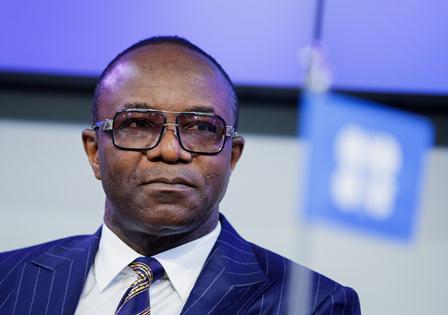
Britain’s Prime Minister David Cameron gestures while speaking with campaign volunteers for “Stronger In” during a visit to Panorama Antennas, a small family business in Wandsworth, south London on June 21, 2016. REUTERS/Adrian Dennis/Pool
British Prime Minister David Cameron made a dramatic last-minute appeal to voters on Tuesday to back staying in the European Union two days before a referendum that will shape the future of the West, as polls indicated the outcome was too close to call.
Britons vote on Thursday on whether to quit the 28-nation bloc amid warnings from world leaders, investors and companies that a decision to leave would diminish the former imperial power’s influence, unleash turmoil on markets and send shock waves around the Western world.
In a rare televised address outside his Downing Street office, Cameron repeated his message that leaving the EU would jeopardize Britain’s economy and its national security, with fewer jobs, fewer allies and higher prices.
“Brits don’t quit,” he said, using the official backdrop to make a direct pitch to older voters considered more euroskeptic and more likely to vote.
“It will just be you in that polling booth. Just you, taking a decision that will affect your future, your children’s future, your grandchildren’s future”.
The Conservative prime minister’s intervention, which was billed as a significant statement but not publicized in advance, came as an opinion poll showed support for remaining in the EU shrinking. The Survation poll put the “In” camp just one percentage point ahead of the campaign for a so-called Brexit, well within the margin of error.
Commentators said the hastily arranged appearance suggested Cameron, who promised the referendum in 2013 under pressure from lawmakers in his Conservative Party, and the “In” campaign were very worried about the outcome.
“Cameron is panicked, it’s out of his hands now,” Arron Banks, a multi-millionaire insurance tycoon who is funding one of the Leave campaigns, said on Twitter.
Raoul Ruparel, co-director of Open Europe, a think-tank, said Cameron wanted to project a solemn, statesmanlike image.
“Because it was called off the cuff it looks panicked, but all people will see from the news are the clips which show him looking very measured and relaxed,” Ruparel told Reuters.
As each side sought to play its last trump cards, the pro-EU “Britain Stronger in Europe” campaign issued a final poster of a door leading into a dark void with the slogan: “Leave and there’s no going back.”
Former England soccer captain David Beckham, a hugely popular public figure, added his voice to Remain’s list of celebrity supporters. “For our children and their children we should be facing the problems of the world together and not alone,” he said.
Leave campaigners stepped up their relentless focus on what they call uncontrolled immigration, saying Cameron had been warned four years ago his goal of reducing net arrivals was impossible due to EU rules.
The anti-EU UK Independence Party issued a poster showing a traffic jam with the message “The school over-run” and saying nearly one in four of Britain’s primary schools were full or oversubscribed.
The EU – already shaken by differences over migration and the future of the euro zone – would lose its second-largest economy, one of its top two military powers and by far its richest financial center.
George Soros, the billionaire who bet against the pound in 1992, wrote in an article for the Guardian newspaper that a vote to leave would trigger a bigger, more disruptive devaluation than the fall on Black Wednesday, when market pressure forced sterling out of the European Exchange Rate Mechanism.
Britain’s biggest carmaker, Jaguar Land Rover, estimates its annual profit could be cut by 1 billion pounds ($1.47 billion) by the end of the decade if Britain leaves the EU, two sources familiar with the company’s thinking told Reuters in the latest forecast of potential economic damage.
There could also be severe political ramifications, with many in the Brexit camp regarding Cameron’s leadership as untenable if there is a vote to leave.
Justice Secretary Michael Gove, the most senior cabinet minister campaigning for Leave, said he would “reflect” on his own position depending on the outcome.
Sterling has climbed in recent days on the back of more positive opinion polls, suggesting the mood of the public was swinging behind the “In” camp.
However, the pound fell from a 5 1/2-month high against the dollar and shares dipped after Survation poll for spread-betting firm IG indicated falling support for the Remain camp.
An earlier ORB survey for the Daily Telegraph put support for Remain at 53 percent, up 5 percentage points on the previous one, with support for Leave on 46 percent, down three points.
“All the signs of ORB’s latest and final poll point to a referendum that will truly come down to the wire,” said Lynton Crosby, a political strategist who advised the ruling Conservative Party at the last national election in 2015.
Campaigning was suspended for three days after the murder of pro-EU lawmaker Jo Cox, who was shot and stabbed to death in her constituency in northern England last Thursday.
Some Leave campaigners accuse the Remain camp of exploiting her death as part of what they portray as a campaign of scaremongering by the establishment at home and abroad.
Turnout is likely to be key to the result, and the ORB poll found that Remain supporters, who had been regarded as being more apathetic, were increasingly motivated to vote.
After Cox’s murder, polls indicated sentiment had swung back to the “In” campaign after a major shift towards Leave.
According to Betfair betting odds, the implied probability of a British vote to remain in the EU is 76 percent, but analysts in the financial markets were more cautious.
“We will go into the vote without high confidence in predicting the outturn in either direction,” JPMorgan researcher Malcolm Barr said in a note to clients.
The “Out” campaign says it is the anti-establishment choice, and its message that EU membership has handed political control to Brussels and fueled mass immigration appears to have struck a chord with many Britons.
That issue again gained prominence when Cameron’s former close aide Steve Hilton said civil servants had explicitly told the prime minister four years ago that his target to cut net immigration to the tens of thousands was unachievable because of the free movement demanded by the EU.
The Remain camp has focused mostly on the economic benefits of EU membership and the risks posed by leaving.
Pro-EU leaders, including former prime ministers Tony Blair and John Major, have warned that an exit could also trigger the break-up of the United Kingdom by prompting another Scottish independence vote if England pulled Scotland out of the EU.
While Remain can count on well-known faces from sport and entertainment for backing, the Leave camp has outstripped its rival in terms of donations. The campaigns for Britain to quit the EU received 16 million pounds ($23.5 million) in donations between Feb. 1 and June 9, while “In” campaigns received 12 million pounds.
Source: Reuters


